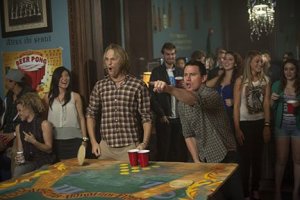Star Rating: 3.5/5
Directors:
- Greg Tiernan – Thomas & Friends
- Conrad Vernon – Shrek II, Monsters vs Aliens, Madagascar III
Cast:
- Seth Rogan – Knocked Up, Pineapple Express, This Is The End, Steve Jobs, Neighbours II: Sorority Rising
- Kristen Wiig – Date Night, Paul, Her, The Martian, Masterminds
- Jonah Hill – Knocked Up, Superbad, 21 & 22 Jump Street, The Wolf of Wall Street, MIB 23
- Michael Cera – Superbad, Scott Pilgrim vs The World, Magic Mike, This Is The End, Human People
- James Franco – Date Night, 127 Hours, Your Highness, The Rise of Planet of The Apes, This Is The End, The Mad Whale
- Salma Hayek – Frida, Puss In Boots, Here Comes The Boom, Grown Ups I-II, Drunk Parents
- Edward Norton – American History X, Fight Club, The Invention of Lying, Birdman, Collateral Beauty
- Paul Rudd – Forgetting Sarah Marshall, Monsters vs Aliens, This Is The End, Captain America III, Mute
- Nick Kroll – I Love You, Man, Date Night, Get Him To The Greek, Knight of Cups, Captain Underpants
- David Krumholtz – Superbad, The Playboy Club, This Is The End, The Judge, Casual Encounters
Music Composers:
- Christopher Lennertz – Horrible Bosses I & II, Ride Along I & II, My Big Fat Greek Wedding II, Bad Moms, The Boss
- Alan Menken – Beauty & The Beast, The Little Mermaid, Aladdin, Pocahontas, The Hunchback of Notre Dame, Enchanted, Beauty & The Beast
Ever wondered what an R-rated animated comedy looks like? No, probably not. That’s why Seth Rogan and Jonah Hill, along with three other writers, have come together to bring us Sausage Party. And full credit to them for doing so!

Frank (Seth Rogan) in a packet with other sausages,waiting to be picked by a god (a human). He hopes to be picked with his girlfriend, Brenda the bun (Kristen Wiig) so that they can live together in the Great Beyond.
Sausage Party predominantly revolves round Frank (voiced by Seth Rogan). Frank is a sausage in a supermarket. Trapped inside a packet with near a dozen other sausages he yearns to be picked by one of the gods (i.e. the humans) and taken to the Great Beyond (i.e. out of the supermarket). It is said that paradise awaits the food that gets picked by humans. However, no food has ever come back to tell the tale. Frank wants to be picked so he can find out and live with his girlfriend, Brenda the bun (voiced by Kristen Wiig), in this supposed paradise.
The plot for Sausage Party might sound utterly absurd, but it is so funny. From start to finish, one cannot help but laugh. Often, one may laugh with embarrassment. But laugh, one will. Indeed, even those who usually cannot stand other (non-animated) films of this genre, such as Superbad, Pineapple Express and 21 & 22 Jump Street can still find Sausage Party very amusing. This is because animation is a different artistic medium and can get away with some of the jokes that real life cannot.
The same is true for the Toy Story movies and for The Simpsons TV-series. While Sausage Party is not on the same intellectual level as those franchises, the movie is not stupid and contains a lot of satire. The Great Beyond is a metaphor for the next world (if it exists) and the search for meaning in life. This is something that all audiences can relate to, regardless of the fact that they are watching non-sentient objects. Moreover, during Frank’s journey, he meets a bagel-shaped Jew (voiced by Edward Norton) and a lavash-shaped Muslim (voiced by David Krumholtz) who don’t want to share an isle; a sauerkraut that looks like Hitler that wants to ‘exterminate the juice’; a meat loaf, voiced by Meat Loaf, singing ‘I’d Do Anything For Love’; a Native-American Indian-looking Firewater, who smokes weed and claims to know ‘The Truth’ about the Great Beyond; and a villainous douche called ‘Il Douche’ (voiced by Nick Kroll), among countless others. All bring their own unique comedic elements to the film, and these satires enrich the experience for viewers tremendously.

Frank and Brenda walking around the supermarket along with a bagel (Edward Norton) and a lavash (David Krumholtz). Typically, the bagel and the lavash do not see eye to eye on anything.
Granted Sausage Party puts forward these satires with the subtlety of a brick through glass. But that does not make them any less funny, it just makes them crude and borderline offensive. Then again, if one is offended by crude humour, this is the wrong film for such a person. In fact, if one is offended by political incorrectness or racial stereotyping, or juvenile, crass, misogynistic and chauvinistic humour, this film is not for such person. The ensemble cast (and their film resumes) should have told such a person to stay away from this movie. And if he/she did not realise this from the cast, one need only look at Brenda the bun to get a sense of what he/she would be in for as the bun looks (unapologetically) like a vagina.
However, regardless of how much one is amused or offended by Sausage Party, the film drags. For a movie that is often funny and only 89 minutes long, this entails that the film cannot hold its audience as well as it thinks it can. Nor is it as witty or stimulating as it fancies itself to be.

The villainous Il Douche (Nick Kroll), stomping around the supermarket. Il Douche is furious with Frank and wants revenge as he blames Frank for his deformed appearance.
After an hour, the film’s lack of wittiness and stimulation is very much down to the sheer volume of swearing. Sausage Party has enough f-bombs to raise London to the ground. There is no need for that many. It undermines the movie as, after a while, the humour (or lack thereof) becomes repetitive and uncreative… that is until the last scene. No-one can fault Sausage Party for a lack of creativity or stimulation by the end, when a (jaw-dropping) food orgy breaks out. If one ever wondered what an R-rated animation looks like, it is the final scene here because it is more pornographic than pornography.
All-in-all, Sausage Party is a very funny film. The movie becomes tedious after the hour mark and there is undoubtedly too much swearing in it. Nevertheless, it is original and innovative. And for all the film’s obscenity, vulgarity, crassness, crudity, misogyny, chauvinism, sexism, borderline racism and satire, one cannot stop laughing despite himself/herself. All comedies, regardless of whether they are animated or not, are judged by how funny they are, and Sausage Party is absolutely hilarious.
PG’s Tips





































